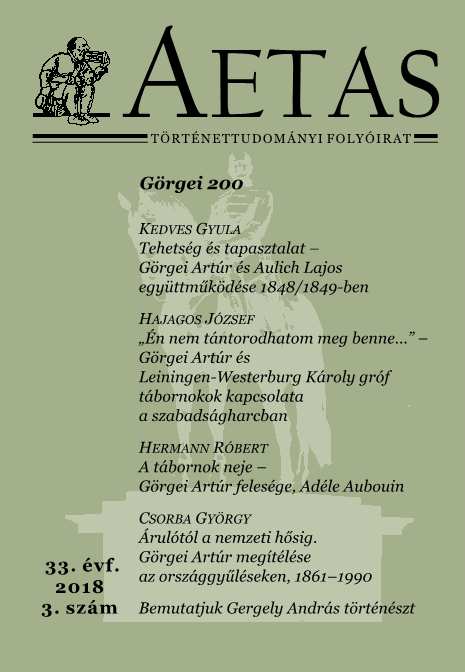Tehetség és tapasztalat. Görgei Artúr és Aulich Lajos együttműködése 1848–1849-ben
Talent and experience– The cooperation between Artúr Görei and Lajos Aulich in 1848/1849
Author(s): Gyula KedvesSubject(s): 19th Century
Published by: AETAS Könyv- és Lapkiadó Egyesület
Summary/Abstract: The cooperation and relationship between generals Artúr Görgei and Lajos Aulich was almost unprecedented in the Hungarian military leadership during the Hungarian War of Independence of 1848-49. This is especially surprising since they were different in almost every way, such as their age, personal motivations, family background, social background, personality, and life goals. While the 30 years old Görgei, who did not only leave the military earlier but also rejected its way of thinking and behavioral norms, was made the country’s most important military leader by the revolution in Autumn 1848, his 55 years old compatriot embraced the military lifestyle, and he was an officer of the Austrian army with rich practical knowledge and significant experience as a battlefield commander. Görgei was a scion of one of the oldest Hungarian noble families, even though he came from an impoverished branch, therefore he became a soldier out of necessity. Aulich was born into a wealthy bourgeois family, and he joined the military because he wanted to, choosing the career of the professional soldier. Görgei’s progress was facilitated by the revolutionaries who considered him one of their own, while they were suspicious of Aulich, and they only gave him limited opportunities out of necessity due to the lack of trained military leaders. Despite all of this they could learn to work together quickly because of their mutual respect based on the acknowledgment of each other’s merits. Despite being his superior for the majority of their relationship, Göregi did not consider Aulich a mere subordinate, but a significantly more experienced peer. However, the’elderly’ soldier did not only subordinate himself to the younger soldier but also trusted his ability as a leader and gladly carried out his ideas he considered appropriate. The first phase of their cooperation was the winter campaign when Aulich became the second most important commander of the army corps led by Görgei. It earned him a promotion to the rank of general as well, and this period from late February to early April also strengthened their respect for each other. The new general was still Görgei’s primary aide, and he also didn’t become his rival when he was no longer his direct subordinate. The spring campaign was the most successful period of their cooperation, this campaign yielded significant results. This period made Aulich a real military leader, on whom the main commander could rely to carry out tasks independently. The last phase of their relationship took place during the direst times, but their mutual respect didn’t fade, and by that time they have developed a bond of friendship as well. Aulich reached the top of the military hierarchy – he took over the position of Minister of War from his former superior, who was forced to resign –, but he remained Görgei’s admirer while supporting him to the best of his abilities, and even served his efforts for Kossuth’s rebellion with deep conviction. However, the rebellion’s last Minister of War could not resolve the conflict between the two leaders. He became a martyr of Hungarian independence in Arad as Kossuth’s general and Görgei’s loyal friend.
Journal: AETAS - Történettudományi folyóirat
- Issue Year: 2018
- Issue No: 3
- Page Range: 5-22
- Page Count: 18
- Language: Hungarian

